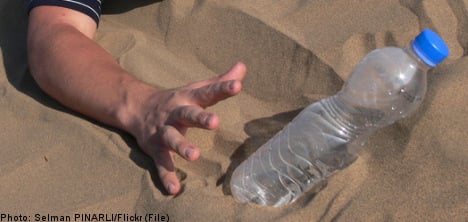The report by Indian think tank Strategic Foresight Group supported by the Swedish International Development Cooperation Agency (Sida) highlighted huge depletion of major rivers such as the Jordan and Yarmouk in the past half a century, the punctual depletion of the Euphrates by drought and the shrinkage of the Dead Sea to a small lake by 2050.
“We provided support to the study that took place over the last one and a half years. The report has now been finalised and launched yesterday,” Helen Rask, head of the Middle East and North Africa regional division at Sida, told The Local on Friday.
“We have a regional cooperative strategy that the Swedish government has adopted. The decision was made during the last cooperation strategy period in August 2010. From 2006 to 2010, one of the major sectors to work with in the Middle East and North Africa was transboundary water management,” she explained.
Sida is supporting initiatives that will eventually lead to effective management of transboundary water issues in the region, according to Rask. Current strategies involve exploring more sustainable uses of water resources while taking into account climate change.
Sida’s efforts concentrate on two subregions, the Jordan and the Tigris, and it is also involved in the Nile River. According to Rask, the total budget of the water study was about 4 million kronor, ($615,000), of which Sida financed half.
At the launch of the report in Geneva on Thursday, Swiss Foreign Minister Micheline Calmy-Rez called for closer cooperation between Turkey, Iraq, Syria, Lebanon, Jordan, the Palestinians and Israel on managing increasingly scarce water resources, arguing that water could also be used to forge a “blue peace.”
“The report comes to an alarming conclusion; five of the seven countries are experiencing a structural shortage and debit of most of the big rivers has declined by 50 to 90 percent between 1960,” she told journalists.
“In the future the main geopolitical resource in the Middle East will be water more than oil,” she added, warning that it was closely tied to peace efforts.
However, the report also acknowledged the difference between the countries, with upstream Turkey in a position to “influence prospects of peace” despite the collapse of 1980s plan to pipe water to Israel and Gulf states.
Downstream territories such as Israel, Jordan and Palestinian territories were in the worst position, with mounting clean water deficits of up to 500 to 700 million cubic metres each. The report also argued that technical solutions such as desalination or wastewater recycling in Israel would ultimately have limited scope.
“Purely unilateral solutions will mainly work for a decade or so but Israel will have to look for external sources and regional cooperation beyond 2020 to ensure its water security,” it said.
Swiss diplomats said they had already started to lobby the seven governments for a joint water cooperation council expanding on an nascent Turkish, Iraqi, Jordanian and Syrian effort, as well as other steps, even if they admitted that it would be challenging.
The report was prepared with support from the governments of Sweden and Switzerland and input received from almost 100 leaders and experts from the Middle East, including heads of state, cabinet ministers, heads of water authorities, members of parliament, diplomats and prominent scholars.


 Please whitelist us to continue reading.
Please whitelist us to continue reading.
Member comments